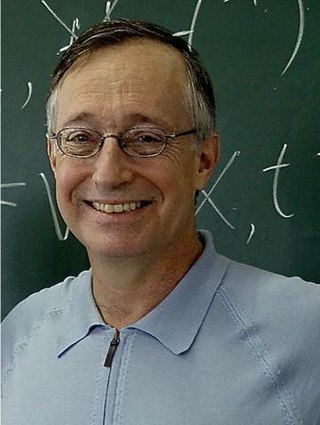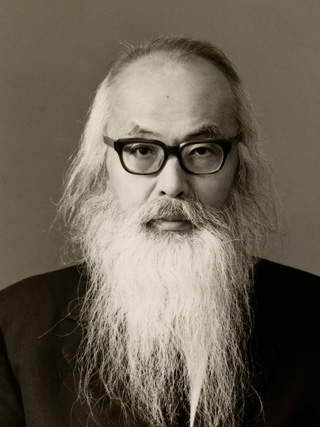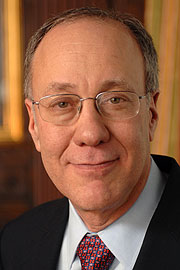
Oskar Ryszard Lange was a Polish economist and diplomat. He is best known for advocating the use of market pricing tools in socialist systems and providing a model of market socialism. He responded to the economic calculation problem proposed by Ludwig von Mises and Friedrich Hayek by claiming that managers in a centrally-planned economy would be able to monitor supply and demand through increases and declines in inventories of goods, and advocated the nationalization of major industries. During his stay in the United States, Lange was an academic teacher and researcher in mathematical economics. Later in socialist Poland, he was a member of the Central Committee of the Polish United Workers' Party.

Paul Robert Milgrom is an American economist. He is the Shirley and Leonard Ely Professor of Humanities and Sciences at the Stanford University School of Humanities and Sciences, a position he has held since 1987. He is a professor in the Stanford School of Engineering as well and a Senior Fellow at the Stanford Institute for Economic Research. Milgrom is an expert in game theory, specifically auction theory and pricing strategies. He is the winner of the 2020 Nobel Memorial Prize in Economic Sciences, together with Robert B. Wilson, "for improvements to auction theory and inventions of new auction formats".

William Jack Baumol was an American economist. He was a professor of economics at New York University, Academic Director of the Berkley Center for Entrepreneurship and Innovation, and Professor Emeritus at Princeton University. He was a prolific author of more than eighty books and several hundred journal articles. He is the namesake of the Baumol effect.

Hirofumi Uzawa was a Japanese economist.

Jonathan David Levin is an American economist and the 13th President of Stanford University. He was previously the Philip H. Knight Professor and Dean of the Stanford Graduate School of Business.
Takeshi Amemiya is an economist specializing in econometrics and the economy of ancient Greece.
Lionel Wilfred McKenzie was an American economist. He was the Wilson Professor Emeritus of Economics at the University of Rochester. He was born in Montezuma, Georgia. He completed undergraduate studies at Duke University in 1939 and subsequently moved to Oxford that year as a Rhodes Scholar. McKenzie worked with the Cowles Commission while it was in Chicago and served as an assistant professor at Duke from 1948 to 1957. Having received his Ph.D. at Princeton University in 1956, McKenzie moved to Rochester where he was responsible for the establishment of the graduate program in economics.

Leonid Hurwicz was a Polish–American economist and mathematician, known for his work in game theory and mechanism design. He originated the concept of incentive compatibility, and showed how desired outcomes can be achieved by using incentive compatible mechanism design. Hurwicz shared the 2007 Nobel Memorial Prize in Economic Sciences for his seminal work on mechanism design. Hurwicz was one of the oldest Nobel Laureates, having received the prize at the age of 90.

Susan Carleton Athey is an American economist. She is the Economics of Technology Professor in the School of Humanities and Sciences at the Stanford Graduate School of Business. Prior to joining Stanford, she has been a professor at Harvard University and the Massachusetts Institute of Technology.
Robert Butler "Bob" Wilson, Jr. is an American economist and the Adams Distinguished Professor of Management, Emeritus at Stanford University. He was jointly awarded the 2020 Nobel Memorial Prize in Economic Sciences, together with his Stanford colleague and former student Paul R. Milgrom, "for improvements to auction theory and inventions of new auction formats". Two more of his students, Alvin E. Roth and Bengt Holmström, are also Nobel Laureates in their own right.

Roger Bruce Myerson is an American economist and professor at the University of Chicago. He holds the title of the David L. Pearson Distinguished Service Professor of Global Conflict Studies at The Pearson Institute for the Study and Resolution of Global Conflicts in the Harris School of Public Policy, the Griffin Department of Economics, and the college. Previously, he held the title The Glen A. Lloyd Distinguished Service Professor of Economics. In 2007, he was the winner of the Sveriges Riksbank Prize in Economic Sciences in Memory of Alfred Nobel with Leonid Hurwicz and Eric Maskin for "having laid the foundations of mechanism design theory." He was elected a Member of the American Philosophical Society in 2019.

Alvin Eliot Roth is an American academic. He is the Craig and Susan McCaw professor of economics at Stanford University and the Gund professor of economics and business administration emeritus at Harvard University. He was President of the American Economic Association in 2017.
Stephen Edward Morris is an economic theorist and game theorist especially known for his research in the field of global games. Since July 2019, he has been a professor of economics at the Massachusetts Institute of Technology. Prior to that he taught at Princeton, Yale, and the University of Pennsylvania. He was the editor of Econometrica for the period 2007–2011, and in 2019 served as president of the Econometric Society.
Drew Fudenberg is a Professor of Economics at MIT. His extensive research spans many aspects of game theory, including equilibrium theory, learning in games, evolutionary game theory, and many applications to other fields. Fudenberg was also one of the first to apply game theoretic analysis in industrial organization, bargaining theory, and contract theory. He has also authored papers on repeated games, reputation effects, and behavioral economics.
Roger Guesnerie is an economist born in France in 1943. He is currently the Chaired Professor of Economic Theory and Social Organization of the Collège de France, Director of Studies at the École des hautes études en sciences sociales, and the chairman of the board of directors of the Paris School of Economics.
Matthew Owen Jackson is the William D. Eberle Professor of Economics at Stanford University, an external faculty member of the Santa Fe Institute, and a fellow of CIFAR.
Dirk Bergemann is the Douglass & Marion Campbell Professor of Economics and Computer Science at Yale University. He received his Vordiplom in economics at Goethe University Frankfurt in 1989, and both his M.A. and Ph.D. at the University of Pennsylvania in 1992 and 1993, respectively.
Benny Moldovanu is a German economist who currently holds the Chair of Economic Theory II at the University of Bonn. His research focuses on applied game theory, auction theory, mechanism design, contests and matching theory, and voting theory. In 2004, Moldovanu was awarded the Gossen Prize for his contributions to auction theory and mechanism design.
Yeon-Koo Che (Korean: 최연구) is a Korean American economist. He is the Kelvin J. Lancaster Professor of Economic Theory at Columbia University, a position he held since 2009. Prior to joining Columbia in 2005, he was a professor at University of Wisconsin-Madison.
Joel Sobel is an American economist and currently professor of economics at the University of California, San Diego. His research focuses on game theory and has been seminal in the field of strategic communication in economic games. His work with Vincent Crawford established the game-theoretic concept of cheap talk.


















